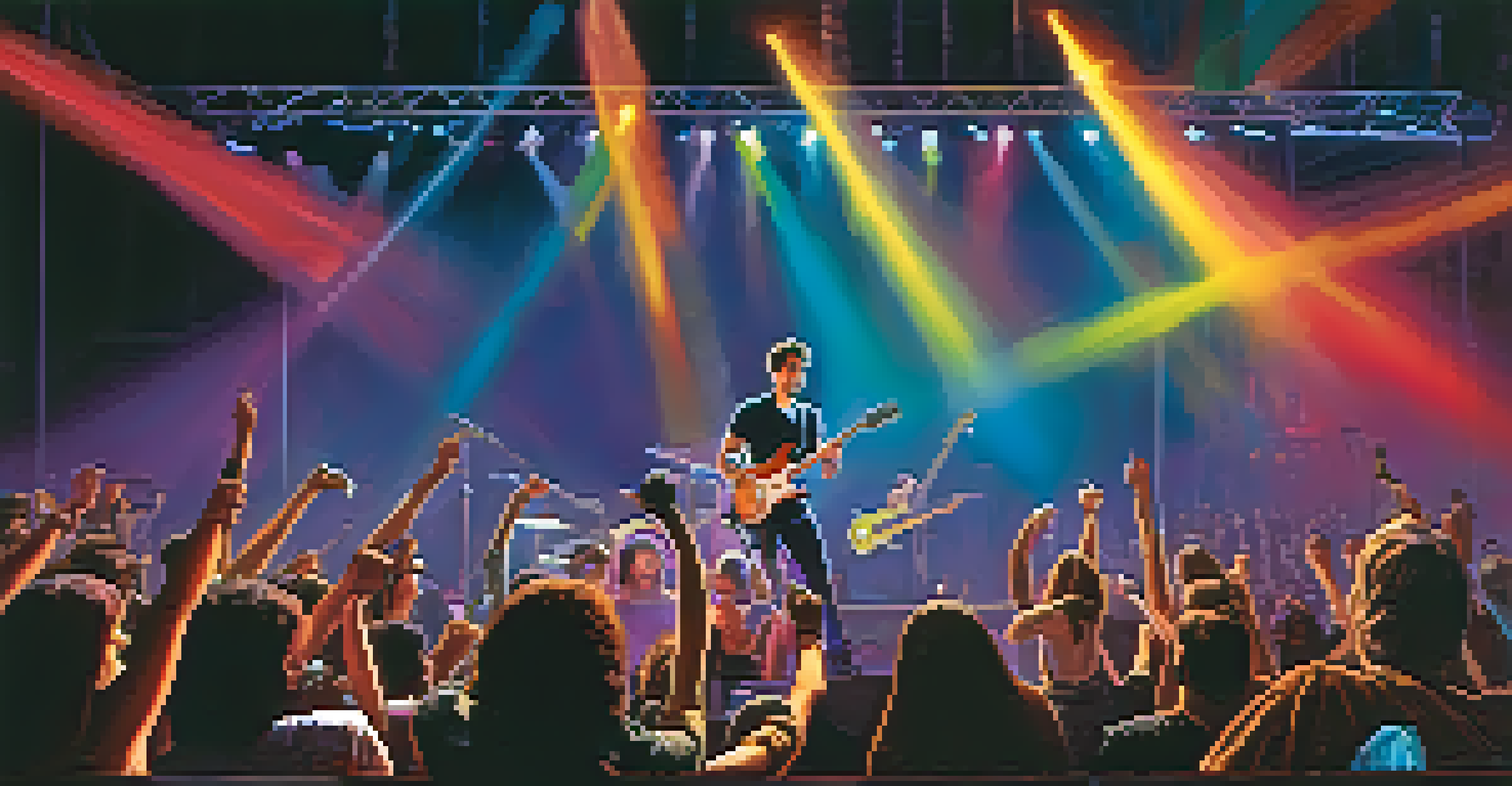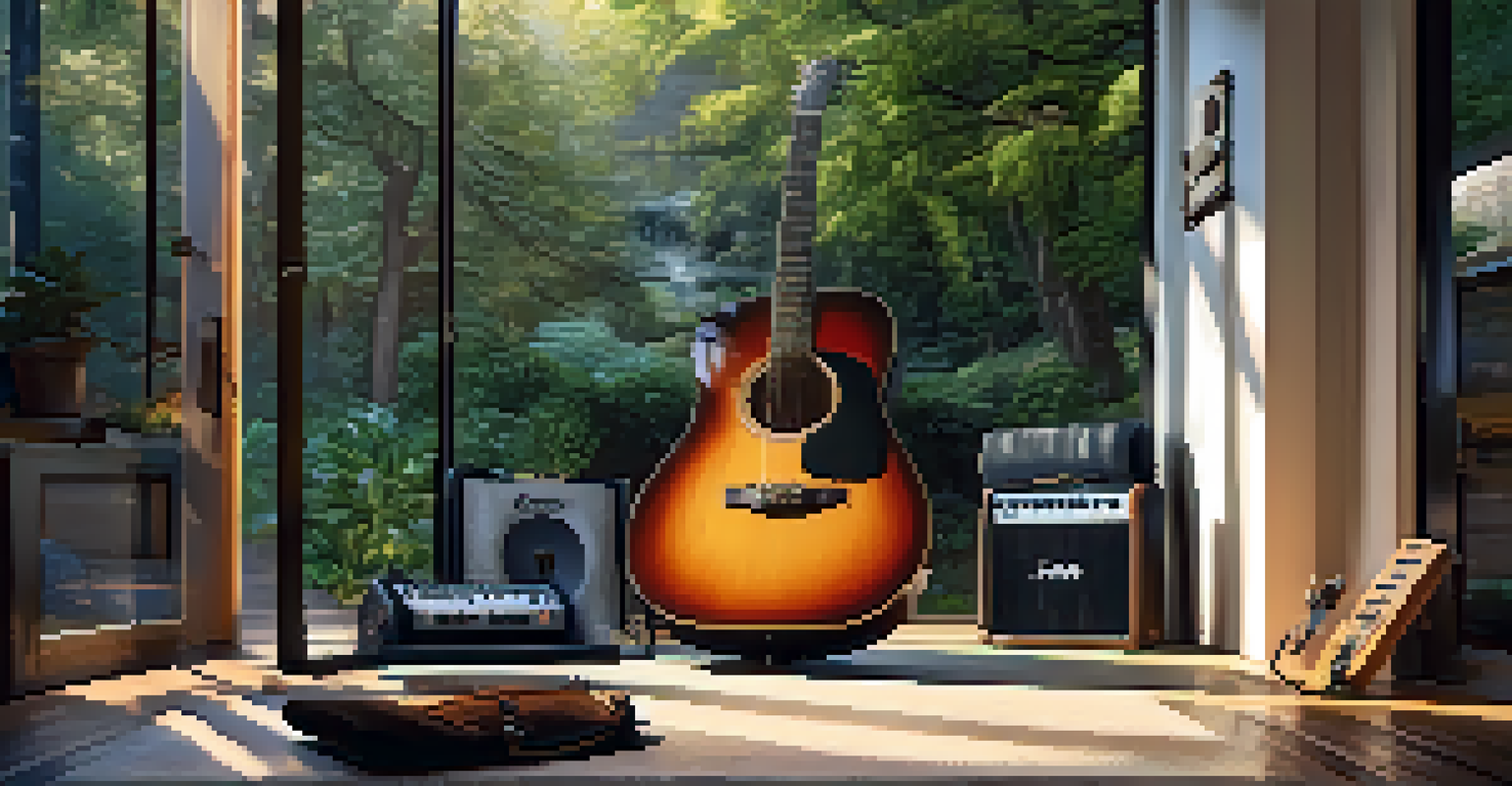Acoustic vs. Electric Music: Pros and Cons for Musicians

Understanding Acoustic Music: The Basics
Acoustic music relies on natural sound production without electronic amplification. Instruments like guitars, pianos, and violins create sound through physical vibrations, offering a warm, organic tone. Many musicians appreciate the authenticity of acoustic music, as it often evokes a deeper emotional connection with the audience.
Music is the shorthand of emotion.
In live settings, acoustic performances can create an intimate atmosphere, drawing listeners into the experience. This simplicity allows musicians to focus on their craft, enhancing their skills in melody and lyricism without the distractions of technology. Additionally, acoustic instruments are typically portable, making it easier to perform in various environments.
However, the acoustic sound can sometimes be overpowered in larger venues, making it essential for musicians to adapt their performance style. The dynamic range of acoustic music is limited compared to electric, which can influence a musician's creative expression. Ultimately, the choice of acoustic music can deeply impact a musician's artistic journey.
Exploring Electric Music: Modern Soundscapes
Electric music, characterized by its use of electronic instruments and amplification, opens up a world of sound possibilities. From electric guitars to synthesizers, these instruments allow musicians to explore diverse genres and styles, enriching their music with unique textures. The versatility of electric music appeals to many artists looking to innovate and push creative boundaries.

With electric music, musicians can easily adjust their sound using effects pedals and software, creating a wide array of sonic landscapes. This adaptability can lead to exciting collaborations and experimentation, enhancing the overall artistic expression. Furthermore, electric instruments often provide greater volume control, making them suitable for larger venues and performances.
Acoustic Music: Authenticity Matters
Acoustic music fosters a deeper emotional connection through its unfiltered sound, making it relatable and resonant for listeners.
On the downside, the reliance on technology can sometimes overshadow the rawness of musical talent. Musicians might find themselves leaning heavily on effects rather than honing their fundamental skills. Balancing the use of technology with genuine musicianship is crucial for artists who choose to explore electric music.
Pros of Acoustic Music for Musicians
One of the significant advantages of acoustic music is its simplicity. Musicians can focus on their technical skills, such as fingerpicking or vocal techniques, without the complexities of electronic gear. This hands-on approach fosters a deeper connection between the musician, their instrument, and the audience.
The beautiful thing about learning is that no one can take it away from you.
Another benefit is the authenticity and warmth that acoustic music provides. Many listeners appreciate the unfiltered sound, often finding it more relatable and emotionally resonant. This genuine quality can lead to stronger fan engagement and a loyal following.
Moreover, acoustic music is highly versatile and can be performed in a variety of settings, from small coffee shops to outdoor festivals. The lack of need for electricity means that musicians can easily adapt to different environments, making it an appealing option for many performers.
Cons of Acoustic Music: Limitations to Consider
Despite its many advantages, acoustic music does come with its limitations. One major drawback is the sound projection; in larger venues, acoustic performances may struggle to reach all audience members effectively. This can lead to an underwhelming experience for both the performer and listeners.
Additionally, the dynamic range of acoustic instruments is often narrower than their electric counterparts. This limitation can hinder musicians from exploring more complex soundscapes or effects, potentially stifling creativity. As a result, some musicians may feel restricted in their artistic expression.
Electric Music: Boundless Creativity
Electric music offers unparalleled versatility and sound manipulation, allowing musicians to push creative boundaries across various genres.
Lastly, the need for meticulous tuning and maintenance of acoustic instruments can be time-consuming. Musicians must also be mindful of environmental factors, such as humidity and temperature, which can affect sound quality. These considerations may deter some artists from fully committing to acoustic music.
Pros of Electric Music: Embracing Innovation
Electric music offers unparalleled versatility, allowing musicians to experiment with various sounds and styles. The ability to manipulate tone, volume, and effects can lead to exciting and innovative compositions that push the boundaries of creativity. This adaptability is particularly appealing in genres like rock, pop, and electronic music.
Another significant advantage is the amplification of sound, making electric music ideal for larger venues and festivals. Musicians can reach a broader audience without compromising sound quality, enhancing their performance experience. The energy of an electric show often captivates listeners, making for a memorable event.
Moreover, electric instruments often come equipped with built-in features that can simplify the learning process. Many musicians find that technology can aid in teaching and experimenting with new techniques, ultimately enriching their musical journey. This blend of tradition and innovation can inspire artists to explore new horizons.
Cons of Electric Music: Potential Pitfalls
While electric music is exciting, it does have its downsides. One of the main concerns is the dependence on technology, which can sometimes overshadow genuine musical talent. Musicians may find themselves relying on effects and presets rather than developing their skills, leading to a less authentic sound.
Additionally, the cost of electric instruments and equipment can be a significant barrier for many aspiring musicians. High-quality gear can be expensive, and the need for setup and maintenance can add to the financial burden. This can discourage talented individuals from pursuing their musical passions.
Explore Your Unique Musical Style
Finding your personal musical style involves experimenting with both acoustic and electric elements to discover what resonates most with you.
Lastly, with the vast array of electronic options available, musicians may feel overwhelmed by the choices. Finding a distinct sound can be challenging, as many artists may end up sounding similar due to the accessibility of certain effects and styles. Striking a balance between personal creativity and technological influence is essential for success in the electric music sphere.
Finding Your Personal Musical Style: Acoustic vs. Electric
Ultimately, the choice between acoustic and electric music comes down to personal preference and artistic goals. Musicians should consider their musical influences, performance environment, and the message they wish to convey through their art. Each style offers unique opportunities for expression, making it essential to explore both avenues.
Experimenting with different genres and instruments can help musicians discover their true sound. Some artists may find joy in blending acoustic and electric elements, creating a fusion that reflects their personality and musical journey. This exploration can lead to a more fulfilling and authentic artistic experience.

It's important to remember that there is no right or wrong choice in this debate. What matters is finding a musical path that resonates with the individual artist, allowing them to connect with their audience and express themselves fully. Embrace the journey, and enjoy the process of musical discovery.